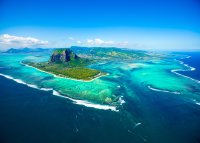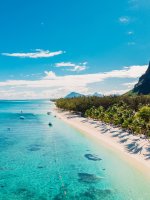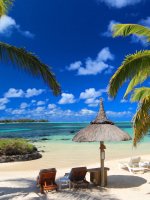Party politics followed the constitutional reforms of 1886 with the ‘oligarques’ of the conservative Parti de l’Ordre dominant over the ‘democrats’ of Action Libérale until the early 1920s. The socialist Mauritius Labour Party (MLP) founded in 1936 represented one side of the traditional two-party system with the Railliement Mauricien on the right. A multi-party system based on ethnic as well as political appeal evolved after 1950.
World War I brought suffering to the island with drastic cuts in shipping causing food shortages and price rises. There was a local campaign after the war for Mauritius to be returned to France but the so-called ‘retrocessionist’ candidates were heavily defeated in the 1921 general election.
World War II brought infrastructural development. The British based a fleet at Port Louis and Grand Port, as well as building an airport at Plaisance and a seaplane base at Baie du Tombeau. A large telecommunications station was built at Vacoas, although the first underwater telephone cable, linking South Africa to Australia, had been laid to Mauritius in 1901.
In the election held after the war, the MLP won the majority of seats in the Legislative Council set up under the 1948 constitution. This success was repeated in 1953. After the 1959 election (the first held following the introduction of universal adult franchise), Hindu doctor (later Sir) Seewoosagur Ramgoolam, leader of the MLP, became chief minister, then premier in 1965, holding the post until 1982. In 1968, Mauritius became an independent country within the Commonwealth of Nations, with Queen Elizabeth II as head of state represented by a governor general.
In 1971, social and industrial unrest led by the Mouvement Militant Mauricien (MMM) resulted in a state of emergency. The party’s leaders, including Paul Berenger, a Franco-Mauritian born in 1945, were jailed for a year.
In the election of 1982, the MMM, with Paul Berenger as general secretary and a Hindu, British-trained lawyer, Anerood Jugnauth, as president, captured all 62 directly elected seats. Anerood Jugnauth became prime minister with Berenger as his finance minister.
Tensions among the ministers resulted in a break when Berenger resigned with ten of his cabinet colleagues. Jugnauth formed a new party, the Mouvement Socialiste Militant (MSM), drawing on defectors from other parties and allying himself with Sir Seewoosagur’s MLP and the Parti Mauricien Social Démocrate (PMSD).
The new alliance scored a victory that gave them 41 of the directly elected seats and five of the eight ‘best loser’ seats. (The ‘best loser’ system was devised by the British to ensure that every ethnic group has adequate representation.) Sir Seewoosagur became governor general.
Following the defection of some party members and the resignation of six parliamentarians because of a drug-smuggling scandal, the next general election was held a year early, on 30 August 1987. This resulted in a win for the alliance of parties led by Prime Minister Anerood Jugnauth. Knighted in 1988, Sir Anerood Jugnauth became prime minister again after a general election in 1991, when he led an alliance of the MSM and MMM. In March 1992, Mauritius became a republic within the Commonwealth and the then governor, Sir Veerasamy Ringadoo, became the first president. In June 1992, Cassam Uteem, a former minister, was nominated as president, an office he held until February 2002.
At the general election held in December 1995, there was a curious repeat of history when, as in 1982, the opposition captured all the 60 seats on Mauritius and allies took the two seats on Rodrigues. The victors were an opposition coalition and their leader, Dr Navin Chandra Ramgoolam, son of the much-revered Sir Seewoosagur Ramgoolam, became prime minister.
Born in 1947, Dr Navin Ramgoolam is a Dublin-qualified medical practitioner and a barrister called to the Bar in London in 1993. In 1994, he formed an alliance with the MMM of Paul Berenger and it was this alliance that captured all the elected seats. However, on 18 June 1997, the Labour Party and MMM split from one another. The Labour Party ruled the country while the MMM headed the opposition.
By the September 2000 elections, Navin Ramgoolam’s popularity had fallen considerably. Many Mauritians felt he was out of touch with the island, having spent much of his life abroad, and allegations of corruption plagued his time in government. The elections saw Ramgoolam defeated by an alliance of the MSM and MMM, who won 50 seats in the parliament. In an unusual step, it was agreed that Sir Anerood Jugnauth would be prime minister for the first three years of the parliamentary term, followed by Paul Berenger for the second three.
February 2002 saw another unexpected shake-up for Mauritian politics. President Cassam Uteem, a Mauritian Muslim, was forced to resign after refusing to give his assent to the proposed prevention of terrorism legislation in the wake of the 11 September 2001 terrorist attacks in New York. His vice president also resigned and on 25 February 2002, Karl Auguste Offman was sworn in as the third president of the Republic of Mauritius. Offman’s term as president lasted just over a year, with Sir Anerood Jugnauth assuming the role when Berenger became prime minister.
When he became prime minister in 2003, Paul Berenger was not only the first white but also the first non-Hindu prime minister since independence in 1968. His time as prime minister came to an end in July 2005, when his party was defeated by the newly formed Socialist Alliance and Dr Navin Ramgoolam once more became prime minister. The result was not unexpected with rising unemployment in the sugar and textile industries, high-profile figures resigning from the government to join the opposition alliance and allegations of corruption all conspiring against the governing MSM–MMM coalition.
In 2010, a coalition comprising the MLP, MSM and PMSD was elected, with the MMM in opposition. Power was again in the hands of two men who have dominated Mauritian politics for decades: President Air Anerood Jugnauth and Prime Minister Dr Navin Ramgoolam. In August 2011, the president’s son, Pravind Jugnauth, pulled his party, the MSM, out of the alliance following allegations of corruption against some of his colleagues. He then joined forces with the opposition MMM.
Sir Anerood Jugnauth resigned as president on 20 March 2012 at the age of 82, saying he could not support current government policies. At the time of writing, the acting president was Monique Ohsan Bellepeau, who had served as vice president since 2010.














